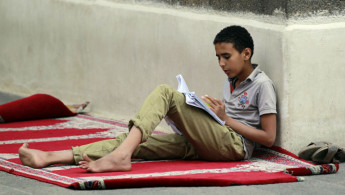Children's future bleakens as Yemen conflict targets education opportunities
Khalil Abdallah, Yemen's schools' supervisor, says what was once a dire situation has now become "infinitely worse".
Amid the ravages of everyday life, and with no signs of an end to the deadly conflict, the future prospects of entire generations of Yemeni school children are being obliterated.
In the war between Houthi rebels and the Saudi-led coalition that backs Yemen's government, the Yemeni schooling system, which even in better days was already fragile and suffered from chronic underfunding, is now grinding to a halt.
International organisations have frequently warned how it remains the children of the Arab world's poorest nation who are bearing the brunt of this conflict.
 |
It is the children of the Arab world's poorest nation who are bearing the brunt of the Yemen conflict. |  |
Since the start of the Saudi-led military campaign in March, at least 700 children have been killed and more than 1,000 injured, according to UN reports.
Last year, the UN confirmed that children make up a third of fighters in armed group conflicts in Yemen.
For those fortunate enough to escape death, injury or forced conscription as child-soldiers, the haunting spectres of malnutrition, starvation, and psychological traumas still await.
Recent reports state that at least 7.4 million children will need psycho-social support to deal with the effects of exposure to violence.
Now added to the suffering of Yemen's children is the denial of any prospect of a basic education.
 |
Now increasingly added to the suffering Yemen's children is the denial any prospect of a basic education. |  |
In a recent report, the UN estimated at least 2.9 million Yemeni children have been forced out of school since the start of the war in March.
In conflict areas, hundreds of schools have been destroyed or occupied by armed forces.
Classrooms have also become the final place of refuge for families forced from their homes.
Many teachers have been displaced; pupils often cannot get to classes - and when they can, teaching hours are reduced.
"My children go to school every morning but I know that they are not receiving a good education. Most of their teachers were displaced," Khalid al-Seyaghi told The New Arab.
"The schools lack resources, whether textbooks or other requirements."
The disastrous consequences of the war have only worsened an education system that was already in need of major repair.
 |
The disastrous consequences of the war has only worsened an education system that was already in need of major repair. |  |
Before the onset of war in 2014, Yemen's politicians declared 2015 "a year of reform" for an education system that had long been criticised as poor - and suffering from neglect.
Schools across the country had long complained of few resources and low educational standards.
Teachers were often forced to work on very low salaries, with minimal resources. And Yemeni parents knew they could not solely rely on government schools to educate their children.
"I knew that the education in was is not a genuine education. Students reached high school while they cannot read or write well," Adel al-Shami, a father of three, told The New Arab.
 |
Students reached high school while they cannot read or write well. - Adel al-Shami, a father of three |
 |
"I was forced to invest in private tutor sessions in maths, physics and chemistry," Shami added. "But because of the war, this is no longer viable."
Now at the turn of 2016, and with the continuation of a war that seems increasingly entrenched, attempts to keep education in the spotlight appear to have been abandoned.
"Today, [the government] has completely forgotten about education," school supervisor Khalil Abdullah told The New Arab.
The crises and chaos in the system are now unprecedented, he added.
The 2015-2016 World Economic Forum in Davos did not include Yemen in its ranking on the quality of global education.
It only stated that Yemen lacked basic standards of quality for education. The UNICEF representative for Yemen says the only hope is an end to the conflict itself.
"What is really needed, above all else, is an end to the conflict," said Julien Harneis.
"Only in that way can the children of Yemen look forward to 2016 with hope rather than despair."


![President Pezeshkian has denounced Israel's attacks on Lebanon [Getty]](/sites/default/files/styles/image_684x385/public/2173482924.jpeg?h=a5f2f23a&itok=q3evVtko)



 Follow the Middle East's top stories in English at The New Arab on Google News
Follow the Middle East's top stories in English at The New Arab on Google News


